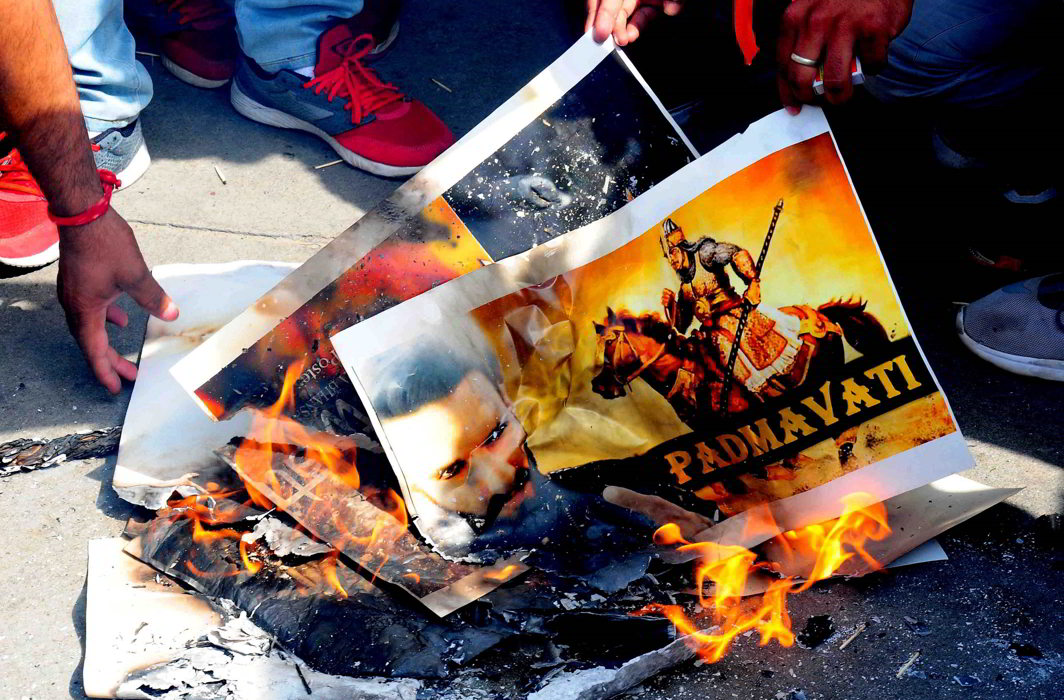Above: Karni Sena has been staging violent protests against the release of Padmavati. Photo: UNI
AMID ‘PADMAVATI’ ROW, SC REFUSES TO BAN DOCUMENTARY ON ARVIND KEJRIWAL
mNew Delhi: The Supreme Court has spoken up for celluloid artistic freedom and licence and refused to ban a documentary on Delhi CM Arvind Kejriwal a day ahead of its scheduled release. The verdict is significant as it came amid the row over the movie Padmavati made by Sanjay Leela Bhansali and calls for ban.
“Freedom of speech and expression is sacrosanct and the right should not be ordinarily interfered with,” a three-judge bench led by Chief Justice of India Dipak Misra said. “The right of a filmmaker can’t be curtailed. Courts are to be extremely slow to pass any kind of restraint order in such a situation and should allow the respect that a creative man enjoys in writing a drama, a play, a book on philosophy, or any kind of thought that is expressed on the celluloid or theatre etc,” the bench said.
In a very poetic order uploaded on the court website, the bench said: “Human history records that there are many authors who express their thoughts according to the choice of their words, phrases and expressions and also create characters who may look absolutely different than an ordinary man would conceive of.”
“A thought provoking film should never mean that it has to be didactic or in any way puritanical. It can be expressive…provoking the conscious or the sub-conscious thoughts of the viewer. If there has to be any limitation that has to be as per the prescription in law… freedom of speech and expression is sacrosanct and… should not be ordinarily interfered with,” the bench said.
“A film or a drama or a novel or a book is a creation of art. An artist has his own freedom to express himself in a manner which is not prohibited in law and such prohibitions are not read by implication to crucify the rights of expressive mind.”
The CJI the dismissed a petition filed by a person facing trial for throwing ink on Kejriwal in 2013. He argued that the documentary, An Insignificant Man, would prejudice his case and wanted the court to intercede to remove any references to him in the movie. The CJI, however, would not hear of it. “Wisely many people who have movies based on them don’t come to court,” he observed.
aid, “A thought-provoking film does not mean it should be puritanical. A film has to be expressive to provoke the conscious and subconscious mind of a viewer.”
Last week, the SC had dismissed a petition seeking a stay on the release of ‘Padmavati’, saying it was an issue squarely within the adjudication domain of the Central Board of Film Certification (CBFC) and the Film Certification Appellate Tribunal. Despite the SC’s snub, some groups have threatened actor Deepika Padukone with violence after she said the protests were a sign of regression.
On Thursday, the SC said, “The courts should be extremely slow in passing any kind of restraint or order stopping a creative man from writing drama, book, philosophy or project his thoughts in a film or theatre art.” The court disposed of the plea against ‘An Insignificant Man’ while clarifying that the trial court would decide the case on merit.
The film was objected to by Nachiketa Walhekar, who is facing trial for allegedly throwing ink at AAP chief Kejriwal in 2013.
Right to freedom of speech sacrosanct: CJI
His counsel Pushkar Sharma said the film had incorporated electronic media recording of the alleged incident to project Kejriwal as a victim, violating Walhekar’s right to a fair trial. He said the filmmakers should either delete the TV footage from the film or put a bold disclaimer about the alleged offence being under the scrutinyof court.
The bench refused to heed these arguments and remained focused on its respect for the right to free speech and expression. The CJI said, “It is worthy to mention that right to freedom of speech and expression is sacrosanct and should not be ordinarily interferedwith. When the CBFC has granted permission for the release of the film after scrutiny, this court should exercise utmost restraint in not granting any injunction.”
Given the vulnerability of writers, authors, filmmakers and novelists at thehandsof dogmatic groups capable of violently airing their disagreement with artistic expression, the bench said, “Be it noted that any film, drama, theatre or novel is a creation of artistic expression. An artist has own freedom to express himself/herself in a manner which is not prohibited in law.” The SC went a step further and said even the prohibitive areas of freedom of speech and expression, specifiedunder Article 19(2) of the Constitution, could not be a ground to kill artistic creativity. “Such prohibition is not meant to crucify the right of an expressive mind,” itsaid.
Times View: The Supreme Court is absolutely right in telling all other courts in the land to exercise extreme restraint in granting stays on films, books, plays or novels. Creators of artistic works must have the freedom to express themselves freely even if their views are not to everybody’s liking. Mob opinion cannot be allowed to dictate the limits to freedom of expression. Our constitution allows for reasonable restrictions to be placed on the freedom of expression, but imposing bans at the drop of a hat merely because some people or even a majority of people feel offended is by no means a reasonable restraint.http://epaper.timesgroup.com/Olive/ODN/TimesOfIndia/#


November 18, 2017 at 10:57 pm
The supreme court shold uphold freedom of speech and expression guaranteed under constitution